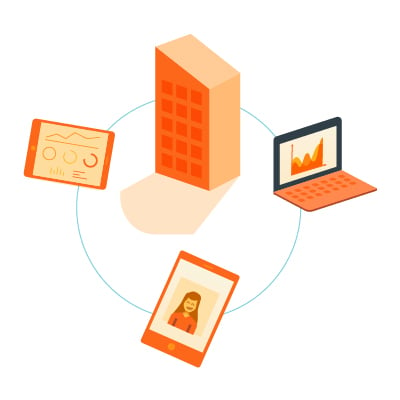As mobile devices become more prevalent in today’s world, it’s time to start thinking about whether BYOD is a right fit for your office.

BYOD has sparked some serious controversy among professionals. Some claim it’s natural and unavoidable in today’s workplace, while others claim that it’s an unnecessary security risk. Here are 3 reasons why BYOD is necessary for your company’s efficiency and relevancy:
1. A Trend That’s Here to Stay
Businesses are beginning to recognize the benefits that BYOD brings to the office. According to Tech Pro Research, currently 59 percent of employers allow the use of personal devices for work purposes and 13 percent of employers plan to implement this policy within the next year. It’s only projected to grow. Backed up by statistics, this is a trend that continues to grow in popularity and acceptance.
With more people becoming well-versed and integrated with technology, it’s a natural transition for companies to implement it in their practice. Already, 87 percent of companies rely on employees using personal devices to access business apps like Slack, Dropbox and Evernote. Applications like these can be easily downloaded onto an employee’s personal device. BYOD is not just a trend, it’s the future of how the workplace operates and communicates.
2. Improve Your Office
BYOD increases a business’ efficiency, technological relevance, and employee satisfaction. Here are a few reasons why companies are making the switch:

- Productivity – When an employee is an expert with their own device, it allows them to work faster.
- Flexibility and Mobility -- Employees can now work remotely from their own devices and conduct business outside of the office.
- Increased happiness -- When employees are allowed to use a device that also contains their personal tasks, it can create a kind of personal satisfaction. Employees can keep track of important details of both their personal life and professional life.
- Reduced costs – Your company will no longer have to worry about costly maintenance or hardware updates. BYOD shifts the responsibility of hardware updates from employer to employee.
- Easy maintenance – Or should that be no maintenance? With BYOD, the company isn’t responsible for issues that may occur on an employee’s device.
- Updated devices -- It’s likely that employees’ devices are newer than the devices provided by the company. Therefore employees’ devices will run faster and there will be less time spent on slow machines.
3. No Security Risks
Although the opposition makes concerns about possible security risks associated with BYOD, there are ways to ensure complete protection. Companies around the world wouldn’t be adopting BYOD if there were detrimental security risks associated with it. As long as employees are properly protecting their devices -- there is nothing to worry about.
As the employer, you can educate your employees on BYOD and how to safeguard their devices -- like frequently updating software and having strong passwords. It’s also important to implement a policy for your employees when adopting BYOD -- so there are clear rules for what functions are allowed on personal devices.

Get on Board with BYOD
With the world of technology growing, there’s no escaping BYOD. The increased use of smartphones and other mobile devices have led so many organizations to adopt BYOD. The array of benefits and solutions BYOD provides means that any organization can benefit from adding BYOD into the fold. There is no better time than now to find out if this is just what your company needs.
Categories: Communication









![The Adoption of Unified Communications - What It Can Do For Your Business. [Updated 2019]](https://www.office1.com/hs-fs/hubfs/Office1%20Blog%20-%20Graphics%20and%20Images/Outdated%20Comm%20System%20Blog%20Graphic01.png?height=200&name=Outdated%20Comm%20System%20Blog%20Graphic01.png)

